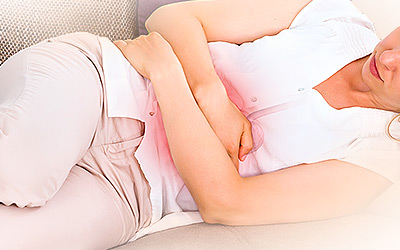Menopause is responsible for massive number of symptoms, one of which is digestive problems. Digestive problems such as cramps can develop into more serious conditions if left untreated. Learning about the causes of menopausal digestive problems is the first step in treatment.
What Is Menopause and How Does it Affect the Digestive System?
Menopause has multiple stages, beginning with perimenopause, which can last from two to ten years. During this time, the remaining follicles in the ovaries lose their sensitivity to FSH (follicle stimulating hormone) and secrete less estrogen, causing the FSH levels to rise. Low estrogen levels result in the follicle rupturing and not releasing an egg. No ovulation occurs during the cycle.
Menopause is triggered by declining estrogen levels. The subsequent hormone imbalance causes menopause symptoms, such as hot flashes, night sweats, depression, mood swings and weight gain.
Menopause is one of the main causes of digestive system problems in women between the ages of 45 and 55. Common symptoms of digestive problems include:
- Cramps
- Bloating
- Gas
- Constipation
- Diarrhea
Lower estrogen levels cause cortisol levels in the body to increase, which contributes to rising blood pressure and blood sugar. This slows the release of stomach acid and the emptying of stomach contents into the intestinal tract, resulting in gas, bloating and constipation.
What Can I Do About Digestive System Problems That Are Caused by Menopause?

There are many ways to rebalance hormones, such as:
Eating healthy. Include foods with naturally occurring estrogen such as yams, soy, potatoes and rice in your diet.
Exercise regularly. This will keep the body balanced, and help improve digestion and prevent constipation.
Stretch. If you have stomach cramps, its important to stretch out and not spend all your time curled up.
Apply heat, such as a heating pad to any cramps.
Keep hydrated. This is important for normal healthy body functions
Reduce caffeine. Caffeine has been linked to increased severity of menopausal symptoms.
Get at least seven or eight hours of sleep a night. This is important for hormone regulation,
Alternative medicine such as herbal teas, acupuncture have gained popularity, although there is no scientific evidence to back most of them up.
For more treatments for digestive problems click here.
Sources
- Aim for Health.(n.d)."Digestive Problems". Retrieved from www.aim4health.com.
- Edwards, Dr. Charmaine. "Digestive disorders are more prevalent in women". North County Journal. http://northcountyjournal.stltoday.com.
- Shin, Fukudo. "Role of corticotropin-releasing hormone in irritable bowel syndrome and intestinal inflammation". Journal of Gastroenterology. 2007, Tokyo, Japan.



